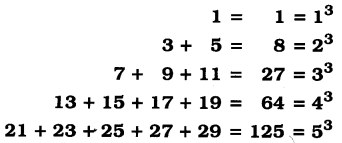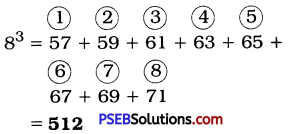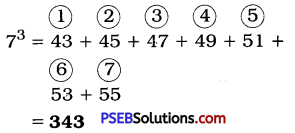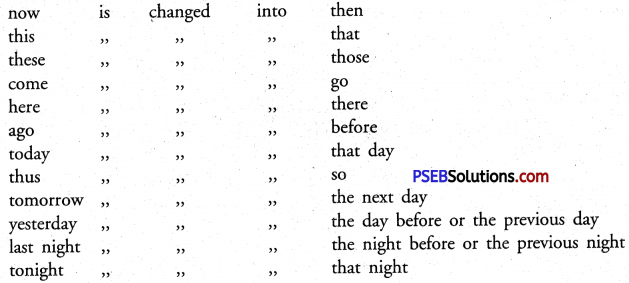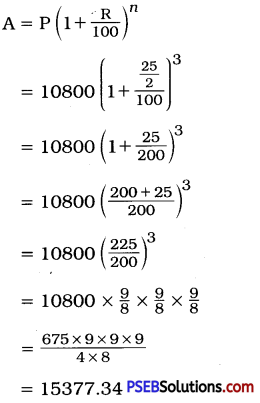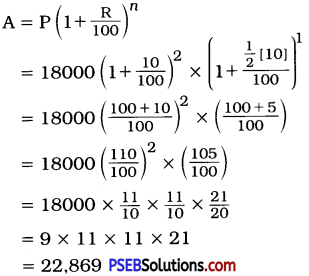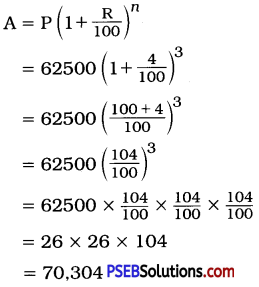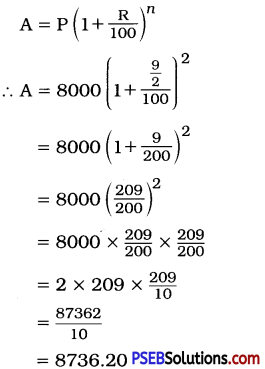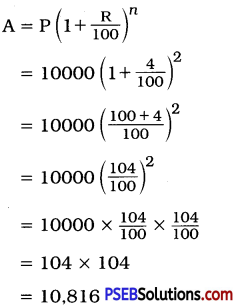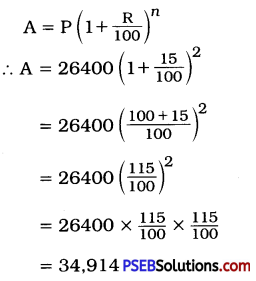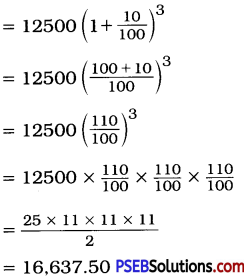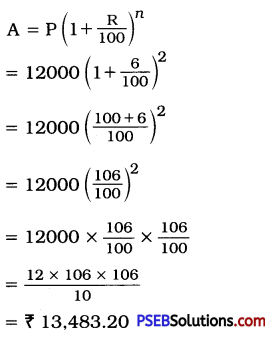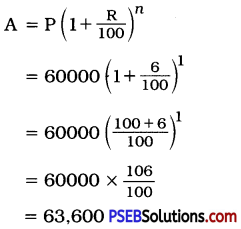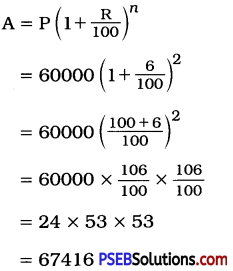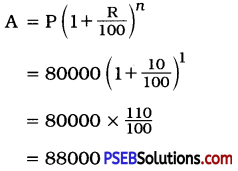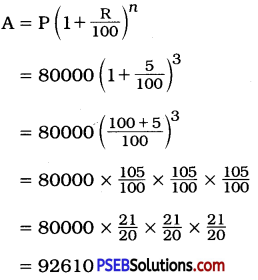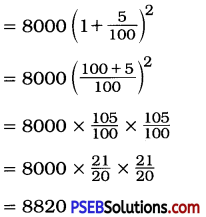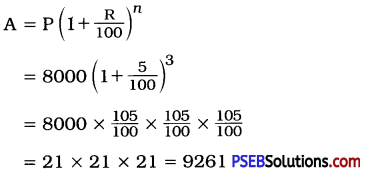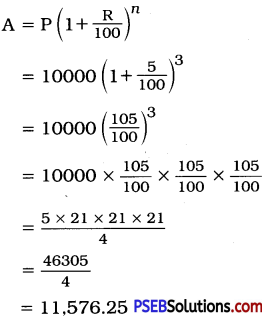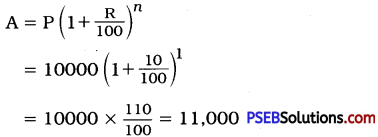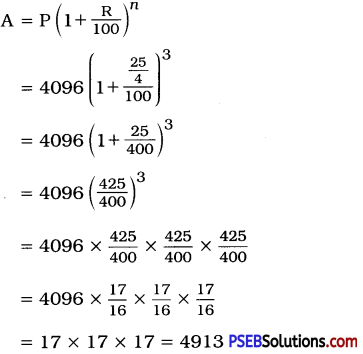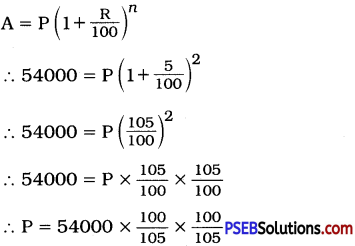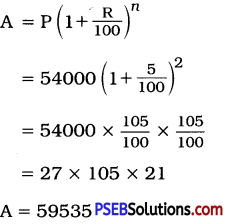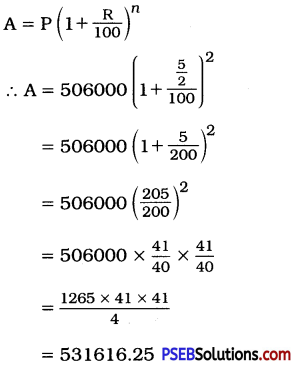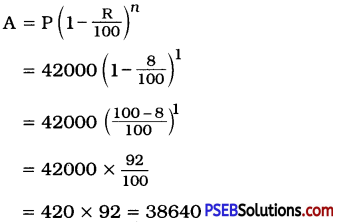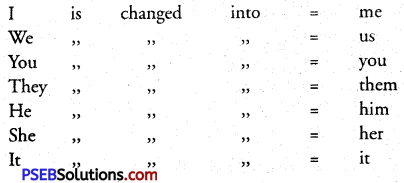Punjab State Board PSEB 12th Class English Book Solutions English Grammar Transformation of Sentences (Simple, Compound & Complex) Exercise Questions and Answers, Notes.
PSEB 12th Class English Grammar Transformation of Sentences (Simple, Compound & Complex)
(Simple, Compound Complex)
Definition of Simple Sentences. A simple sentence is one that contains one finite verb, either expressed or understood. It simply means that it has one finite verb and is consequently a single independent clause.
Sentence : (S = Subject, V = Verb, O = Object)
Examples:
- Boys are running.
- Boys and girls play.
- The handsome boy gave his mother a red rose.
- He gave his brother a book.
Compound Sentences. Let us have a look at the sentence. He rose and went to the door of his room. There are two finite verbs-rose and went. It is made up of two clauses, each containing finite verb and joined by the conjunction ‘and’. Neither of the two clauses in the sentence is dependant on the other for its grammatical function. Such a sentence is called a compound sentence.
Complex Sentence. It is a sentence made up of a main clause and one or more subordinate clauses.
I met a boy who has plenty of push and drive, (one subordinate clause).
You may leave when I tell you to.
I liked the Shimla climate because it was healthy, but Suresh preferred the summer of Delhi, (two subordinate clauses).

Table showing conjunctions used in compound and complex sentences.
| In Compound Sentences |
In Complex Sentences |
| and |
who, whom, which |
| but |
whose |
| or |
that |
| nor |
if, unless |
| neither |
when, while, till, until |
| either |
before, after |
| neither ……… nor |
where |
| either ……….. or |
why |
| as well as |
as, because, since |
|
so, that, lest |
|
though |
(a) Conversion of simple sentences into complex:
1. By adding a Noun Clause to the Principal Clause.
| Simple |
Complex |
| 1. You seem to be a look |
It seems that you are a fool. |
| 2. She confessed her guilt. |
She contessed that she was guilty. |
| 3. The child appears to be angry. |
It appears that the child is angry. |
| 4. It looks like rain. |
It looks that it will rain. |
2. By adding an Adverb Clause to the Principal Clause.
| Simple |
Complex |
| (a) 1. He is too fat to run. |
He is so fat that he cannot run. |
| 2. This load is too heavy to carry. |
This load is so heavy that one cannot carry it. |
| (b) 1. He is the tallest boy in the class. |
No other boy in the class is as tall as he. |
| 2. I shall write to you on reaching Delhi. |
I shall write to you when I reach Delhi. |
| 3. India is the land of my birth. |
India is the land where I was born. |
3. By adding an Adjective Clause to the Principal Clause.
| Simple |
Complex |
| 1. Columbus was the first to discover America. |
He is a man on whom you can depend. |
| 2. He is a man to be depended upon. |
Columbus was the first who discovered America. |
| 3. This is the way to earn huge |
This is the way in which huge profits can be earned. |
Conversion of Simple Sentences into Compound Sentences.
A Simple Sentence can be changed into a Compound Sentence by expanding a word or a phrase into co-ordinate clause by using a co-ordinate conjunction.
Compound Sentences are converted into Simple ones by using a participle or a prepositional phrase or a Gerund or Infinitive in place of one of the co-ordinate clauses.
Interchange of Simple and Compound Sentences.
1. Simple : He was honoured for his honesty.
He was hottest and so he was honoured.
2. Simple : Taking his gun he shot at the bird.
He took his gun and shot at the bird.
3. Simple : You must work hard to pass the examination.
You must work hard or you will not pass the examination.
Interchange of compound and complex Sentences:
1. Compound : Spare the rod and spoil the child.
Complex : If you spare the rod, you will spoil the child.
2. Compound : He confessed his guilt or he would have been punished.
Complex : If he had not confessed his guilt, he would have been punished.
3. Compound : Go wherever you like, only do not stay here.
Complex : You may go wherever you like but you do not stay here.
4. Compound : Leave this room or I shall compel you to do so.
Complex : Unless you leave this room, I shall compel you to do so.
5. Compound : He was a poor man, but he was always honest.
Complex : He was always honest although he was poor.
6. Compound : He stood up to speak and everyone was at once silent.
Complex : Everyone was at once silent when he stood up to speak.
7. Compound : He was very tired and therefore he fell sound asleep.
Complex : He fell sound asleep, as he was very tired.
8. Compound : Confess your fault and I will pardon you.
Complex : If you confess your fault, I will pardon you.
9. Compound : He lost a watch, but he has found it again.
Complex : He has found the watch that he lost.
10. Compound : He worked very hard therefore he succeeded.
Complex : He succeeded because he worked very hard.
Exercise 1
Change the following simple/compound sentences into complex sentences:
| 1. This was a vague possibility. |
1. This was a possibility which was vague. |
| 2. The old lady made one end of the silk thread fast to Tom’s tooth. |
2. It was the old lady who made one end of the silk thread fast to Tom’s tooth. |
| 3. It makes my flesh crawl to hear you. |
3. It makes my flesh crawl when I hear you. |
| 4. The groans ceased and the pain vanished from the toe. |
4. When the groans ceased, the pain vanished from the toe. |
| 5. Monday morning found Tom Sawyer miserable. |
5. When Monday morning came, Tom Sawyer found himself miserable. |
| 6. He generally began that day by wishing he had no intervening holiday. |
6. He generally began that day by wishing that he had no intervening holiday. |
| 7. When he found no ailment, he investigated again. |
7. He investigated again because no ailment was found. |
Exercise 2 (Textual)
Transform the following:
1. She could not prove her innocence. (Change into a Complex sentence)
2. I sold my lame horse. (Change into a Complex sentence)
3. Here comes a girl in red. (Change into a Complex sentence)
4. You can join duty as you are well now. (Change into a Compound sentence)
5. I knew her to be intelligent. (Change into a Complex sentence)
6. The doctor is hopeful of her recovery. (Change into a Complex sentence)
7. If she does not weep, she will die. (Change into a Compound sentence)
8. He was fined because of his absence. (Change into a Simple Sentence)
9. Seeing the signal, the troops marched out. (Change into a Complex sentence)
10. You must encourage him, he is sure to lose. (Change into a Compound Sentence)
Answer:
She could not prove that she was innocent.
I sold my horse that was lame.
Here comes a girl who is in red.
You are well and you can join duty.
I knew that she was intelligent.
The doctor hopes that she will recover.
She must weep or she will die.
He was fined for his absence.
The troops marched out as they got the signal.
You must encourage him or he will lose.

Exercise 3 (Textual)
Transform the following sentences:
1. Girish found a bag and a pen. (Change into Compound)
2. At last the spider reached the cobweb.
3. Seeing a tiger coming, he ran away.
4. Inspite of his wealth he is unhappy. (Change into Compound)
Answer:
1. Girish found not only a bag but a pen also.
2. The spider made the last attempt and reached the cobweb.
3. He saw a tiger and ran away.
4. He is unhappy though he is wealthy.
Exercise 4 (Textual)
Change the following sentences from Simple to Compound:
1. Having taken food, he went to school.
2. The sun having risen, the fog disappeared.
3. Having finished his task, he went to school.
4. Going to Adelaide, Anushka saw the match.
5. He laboured hard to succeed.
Answer:
1. He took food and went to school.
2. The sun rose and the fog disappeared.
3. He finished his task and went to school.
4. Anushka went to Adelaide and saw the match.
5. He laboured hard for he wanted to succeed.
Exercises 5
Change the following Compound sentences into Simple sentences:
1. He took out his gun and set out for hunting.
2. He met the Principal and came back.
3. He saw the bird and shot it.
4. He was too poor, so he could not pay the debt.
5. He was very weak, so he couldn’t walk.
Answer:
1. Taking out his gun, he set out for hunting.
2. After meeting the Principal, he came back.
3. Seeing the bird, he shot it.
4. He was too poor to pay the debt.
5. He was too weak to walk.
Exercise 6
Change the following Simple sentences into Complex sentences:
1. Reema did not admit her fault.
2. A poor man enjoys peace of mind.
3. He is too weak to run.
4. He hoped to win the prize.
5. Some trees fold their leaves at night.
6. This is not the way to clean things.
7. You cannot solve a simple problem.
8. The news spread like wild fire.
9. I could see no means of making tea.
Answer:
1. Reema did not admit that she was at fault.
2. A man who is poor enjoys peace of mind.
3. He is so weak that he cannot run.
4. He hoped that he would win the prize.
5. There are some trees that fold their leaves at night.
6. This is not the way how things are cleaned.
7. You cannot solve a problem that is simple.
8 The news spread as if it were wild fire.
9. I could see no means by which tea could be made.
Exercise 7
Change the following into Complex sentences:
1. To our surprise we found that these were no other than pelicans.
2. The island seemed to be divided into squares.
3. We turned to look in the direction pointed out.
4. He would take the rule to remeasure.
5. He stared at the approaching young be beauty.
6. They held out a ball like a pineapple.
7. I do not expect to see him back.
8. A man in a surging crowd lifted up the child.
9. They had come upon a footpath while in a field.
10. I like doing a little job of this sort.
Answer:
1. We were surprised to find that these were no other than pelicans.
2. It seemed that the island was divided into squares.
3. We looked in the direction which was pointed out.
4. He would re-measure with the rule which he had taken.
5. He stared at the young beauty that was approaching.
6. They held out a ball which was like a pineapple.
7. I do not expect that I will see him back.
8. A man in the crowd that was surging lifted up the child.
9. They had come upon a footpath which was in a field.
10. I like doing a little job which is of this sort.
Exercise 8
Do as directed:
1. We go to college to receive education. (Change into Complex)
2. O what a fall was there, my countrymen ! (Change into Assertive)
3. He is a great fool. (Change into Exclamatory)
4. I reached college in time (Change into Interrogative)
5. Why don’t you work hard ? (Change into Assertive)
6. This news is too good to be true. (Remove ‘too’)
7. As soon as I reached the college, the bejl rang. (Change into Negative)
8. Birds do not fly as fast as the aeroplane. (Change into Comparative)
9. Where did you see him ? (Change the Voice)
10. The teacher said to me, “Do you want to sing ?” (Change the Narration)
Answer:
1. We go to college so that we may receive education.
2. My countrymen, it was a very nasty fall.
3. What a fool he is !
4. Did you reach college late ?
5. You should work hard.
6. This news is so good that it cannot be true.
7. No sooner did I reach the college than the bell rang.
8. Aeroplane flies faster than birds.
9. Where was he seen by you ?
10. The teacher asked me if I wanted to sing.

Exercise 9
Do as directed:
1. It is too cold for me to go out. (Remove ‘too’)
2. None but the brave could accomplish this task. (Change into affirmative)
3. As soon as he saw the ghost, he started shuddering with fear. (Rewrite by using ‘No sooner’)
4. Why waste time in loitering outside the cinema ? (Change into Assertive)
5. Man is a wonderful piece of work. (Change into Exclamatory)
6. His hard work brought him a brilliant success. (Change into Complex sentence)
7. You ought to have helped your friend. (Change the voice)
8. The beggar said to me, “Please give me some money.” (Change the Narration)
9. This boy is more intelligent than any other student in the class. (Change the degree of Comparison)
10. Unless you are not careful, you will run into debt. (Correct the sentence)
Answer:
1. It is so cold that I cannot go out.
2. Only the brave could accomplish this task.
3. No sooner did he see the ghost, than he started shuddering with fear.
4. Don’t waste time in loitering outside the cinema.
5. What a piece of work is man !
6. He worked so hard that it brought him a brilliant success.
7. Your friend ought to have been helped by you.
8. The beggar requested me to give him some money.
9. This boy is the most intelligent student in the class.
10. Unless you are careful, you will run into debt.
Exercise 10
Do as directed:
1. These mangoes are too cheap to be good. (Remove ‘too’)
2. I saw a wounded bird. (Change into Complex sentence)
3. Honey is made by bees. (Change the Voice)
4. I have promises to keep. (Separate it in two sentences)
5. He is sometimes foolish. (Change into Negative)
6. No sooner did he see the lion than he took to he heels.
7. Can money buy health ? (Rewrite using ‘as soon as’)
8. They say honesty is the best policy. (Rewrite as ‘Statement’)
9. She is better than any other dancer in the college. (Change the Voice)
10. She left no plan untried. (Change into Superlative)
Answer:
These mangoes are so cheap that they cannot be good. I saw a bird which was wounded.
Bees make honey.
I have promises. I have to keep them.
He is not always wise.
As soon as he saw the lion, he took to his heels. Money cannot buy health.
It is said that honesty is the best policy.
She is the best dancer in the college.
She tried every plan.
Exercise 11
Do as directed:
1. As soon as the young man sensed trouble, he disappeared. (Rewrite by using ‘No sooner’)
2. The officer was so busy yesterday that he was not able to receive his visitors. (Use ‘too’)
3. Isn’t he exceptionally handsome ? (Change into assertive)
4. A soldier and afraid of bullets ! (Change into assertive)
5. My friend went to England to attain higher education. (Change into complex)
6. The patient had died before the doctor had arrived. (Correct the sentence)
7. She said to me, “Let us go to Shimla for holidaying.” (Change the narration)
8. You should look up all these words in a dictionary. (Change the voice)
9. Mount Everest is the highest peak in the world. (Change the degree of comparison)
10. Is there anything greater than the love of mother ? (Change into negative)
Answer:
1. No sooner did the young man sense trouble, than he disappeared.
2. The officer was too busy yesterday to receive his visitors.
3. He is exceptionally handsome.
4. It is disgraceful that a soldier should be afraid of bullets.
5. My friend went to England so that he might attain higher education.
6. The patient had died before the doctor arrived.
7. She suggested to me that we should go to Shimla for holidaying.
8. All these words should be looked up in a dictionary by you.
9. No other peak in the world is as high as Mount Everest.
10. There is nothing greater than the love of mother.
Exercise 12
Transform the following sentences as directed:
1. This tree is too high for me to climb. (Remove ‘too’)
2. America is the richest country in the world. (Change the degree of comparison)
3. You will have to clear the arrears. (Change the voice)
4. He said to me, “What were you doing at this time yesterday ?” (Change the narration)
5. Who does not want to be rich ? (Change into affirmative)
6. Can money buy health ? (Change into assertive)
7. He went to the hospital to consult the doctor. (Change into complex form)
8. Had you not helped me, I ………… (Complete the sentence)
9. As soon as the Minister rose to speak, the public started shouting at him. (Use ‘No sooner’)
10. Until he does not work hard, he will not pass. (Correct the sentence)
Answer:
1. This tree is so high that I cannot climb it.
2. No other country in the world is richer than America.
3. The arrears will have to be cleared by you.
4. He asked me what I was doing at that time the previous day.
5. Everybody wants to be rich.
6. Money cannot buy health.
7. He went to the hospital so that he might consult the doctor.
8. Had you not helped me, I would have been ruined.
9. No sooner did the Minister rise to speak, than the public started shouting at him.
10. Unless he works hard, he will not pass.
Exercise 13
Transform the following sentences as directed:
1. His application had been rejected. (Rewrite in the negative form)
2. When the peasants heard this they were much alarmed. (Rewrite in a simple sentence)
3. None but a fool could do it. (Change into affirmative)
4. She would utter the prettiest of thoughts. (Change the degree of comparison)
5. I am awfully glad you came. (Rewrite using too)
6. As soon as he saw the thief, he started shuddering with fear. (Rewrite by using ‘No sooner’)
7. There is no place like home. (Change into interrogative)
8. Did you see her ? (Change the voice)
9. The beggar said to me, “Please give me some money.” (Change the narration)
10. It is very nice of him that he is here today. (Change into exclamatory)
Answer:
1. His application had not been accepted.
2. The peasants were very much alarmed on hearing this.
3. Only a fool could do it.
4. She could utter prettier thoughts than others.
5. I am too glad that you came.
6. No sooner did he see the thief than he started shuddering with fear.
7. Is there any place like home ?
8. Was she seen by you ?
9. The beggar requested me to give him some money.
10. How nice of him to be here today !

Miscellaneous Exercises on All Types of Transformation
Exercise 1
Transform the following sentences as directed:
1. As soon as Sir Roger came home he called for wax candles. (Use no sooner …….. than)
2. It is probable that he will come back. (Change into a simple sentence)
3. He ran away or they would have killed him. (Change into a complex sentence)
4. What would I not give to make you happy ?) (Change into an assertive sentence)
5. Chennai is one of the largest cities in India. (Use the comparative degree of large)
Answer:
1. No sooner did Sir Roger come home than he called for wax candles.
2. Probably he will come back.
3. If he had not run away, they would have killed him.
4. I would give you anything to make you happy.
5. Chennai is larger than many other cities in India.
Exercise 2
Transform the following sentences as directed:
1. He is too good to deceive any one. (Remove too)
2. He ate twenty sandwiches in ten minutes. (Change into passive voice)
3. What a beautiful picture it is ! (Change into an assertive sentence)
4. Can this news ever be true ? (Change into an assertive sentence)
5. Calcutta (Kolkata) is the largest city in India. (Change the degree of comparison)
6. Ajay is one of the best boys of the class. (Change the degree of comparison)
Answer:
1. He is so good that he cannot deceive any one.
2. Twenty sandwiches were eaten by him in ten minutes.
3. It is a very beautiful picture.
4. This news can never be true.
5. Calcutta (Kolkata) is larger than any other city in India.
6. Ajay is better than many other boys in the class.
Exercise 3
Transform the following sentences as directed:
1. He is the brightest boy of the class. (Change the degree of comparison)
2. Are you a god that no one should oppose you ? (Change into the assertive form)
3. Don’t permit any one to leave before time. (Change into the passive voice)
4. There was no one greater than Napoleon in his day. (Change into affirmative)
5. This news is too good to be true. (Remove too)
6. There is no one that does not like him. (Change into the affirmative)
7. What a beautiful sunset ! (Change into the assertive form)
Answer:
1. No other boy of the class is as bright as he.
2. You are not a god that no one should oppose you.
3. No one should be permitted to leave before time.
4. Napoleon was greater than all in his day.
5. This news is so good that it cannot be true.
6. Everyone likes him.
7. It is a very beautiful sunset.
Exercise 4
Rewrite the following sentences as directed:
1. To eat too much makes one fat. (Remove too)
2. I have told you a thousand times not to do it. (Use already).
3. He is so honest that he will not accept a bribe. (Use too)
4. The judge suspected that the witness had been bribed. (Change into active form)
5. One more word, and I will send you out of the room. (Use if)
6. How sad was the sight of the deserted city ! (Transform to assertive)
7. Very few countries are as hot as India. (Change to comparative)
8. They will look after you well. (Change into passive form)
Answer:
1. To eat in excess makes one fat.
2. I have already told you not to do it.
3. He is too honest to accept a bribe.
4. The judge suspected that someone bribed the witness.
5. If you utter one more word, I will send you out of the room.
6. The sight of the deserted city was Very sad.
7. Very few countries are hotter than India.
8. You will be looked after well by them.
Exercise 5
Rewrite the following sentences as directed:
1. This news is too good to be true. (Remove too)
2. She is so intelligent that she will understand it. (Use too)
3. Prevention is better than cure. (Change the degree of comparison)
4. As soon as he saw his friend’s burnt house, he burst into tears. (Use no sooner …………. than)
5. I shall remember your kindness. (Use the negative without changing the meaning)
6. He does not like you. (Use a tag question)
7. No one can serve two masters. (Change into interrogative form)
8. A sailor and afraid of storm ! (Change into assertive form)
Answer:
1. This news is so good that it cannot be true.
2. She is too intelligent not to understand it.
3. Cure is not as good as prevention.
4. No sooner did he see his friends burnt house, than he burst into tears.
5. I shall never forget your kindness.
6. Does he ?
7. Can anyone serve two masters ?
8. It is a shame for a sailor to be afraid of storm.

Exercise 6
Rewrite the following sentences as directed:
1. He succeeded in everything that he attempted. (As a negative sentence)
2. Everyone has heard of Columbus. (As an interrogative sentence)
3. Give him a share of your cake. (Use the word in italics in the passive voice)
4. We cannot dispense with food and water. (Use the adjective form of the word in italics)
5. I am very pleased to accept your invitation. (Use the noun form of the word in italics)
6. That play was published after the death of its author. (Substitue a single word for the words in italics)
Answer:
1. He failed in everything that he attempted.
2. Who has not heard of Columbus ?
3. Let a share of your cake be taken by him.
4. Food and water cannot be regarded as dispensable by us.
5. I feel a great pleasure to accept your invitation.
6. That play was published posthumously.
Exercise 7
Rewrite the following sentences as directed:
1. Get out of my room and let me do my work. (Make the sentence a bit polite)
2. She spoke very gently to explain her point of view. (Use the adjective form of the italicized word)
3. The distinguished visitor received a warm welcome at the airport. (Use the adverbial form of the word in italics)
Answer:
1. Kindly allow me to do my work in the room.
2. She explained her point of view in a gentle way.
3. The distinguished visitor was welcomed warmly at the airport.
Exercise 8
Rewrite the following sentences as directed:
1. He is so weak that he cannot sit in bed. (Use too to)
2. He used force to turn the beggar out of his house. (Use the adverb form of force)
3. I am glad that my intention to become a soldier has received your assent. (Use the verb form of assent)
4. If only I could meet him and give him proper advice! (Change from an exclamatory into an assertive sentence)
5. I cannot refuse you anything. (Turn into a positive sentence)
6. Your lack of manners has shocked me much. (Change the voice)
Answer:
1. He is too weak to sit in bed.
2. He turned the beggar forcibly out of his house.
3. I am glad that you have assented to my intention to become a soldier.
4. I long to meet him and give him proper advice.
5. Iam willing to give you anything.
6. I have been shocked much by your lack of manners.
Exercise 9
Rewrite the following sentences as directed:
1. He is in the habit of grumbling. (Rewrite using used to)
2. He forcibly made his way through the crowd. (Substitute the verb form for forcibly)
3. My mother did not give me permission to swim. (Rewrite using let)
4. We will have to come again. (Rewrite using must)
5. He is so weak that he cannot walk. (Rewrite using too)
6. The battery is strong and should last twenty-four hours. (Rewrite using enough)
Answer:
1. He is used to grumbling.
2. He forced his way through the crowd.
3. My mother did not let me swim.
S 4. We must come again.
5. He is too weak to walk.
6. The battery is strong enough to last twenty-four hours.
Exercise 10
Rewrite the following sentences as directed:
1. We live in the same house but we do not like each other. (Rewrite this sentence using although)
2. Tom as well as John was in high spirits. (Rewrite using both)
3. I told you to work hard. (Change into interrogative)
4. On hearing the post office, he rushed to the news of his success. (Rewrite this in the proper order so as to make sense)
Answer:
1. Although we live in the same house, yet we do not like each other.
2. Both Tom and John were in high spirits.
3. What did I tell you ?
4. On hearing the ngws of his success, he rushed to the post office.
Additional Exercises (Solved) Based on Grammar Items
Exercise 1
Read the following sentences and identify them as simple or compound or complex sentences.
1. Our college students went to Agra and saw the Taj.
2. She studied hard yet could not pass.
3. Life is real, life is earnest.
4. We must run or we will miss the train.
5. Nalini dances on the stage.
6. Rewa who passed by me is a charming girl.
7. Girls are dancing.
8. The Principle imposed a heavy fine on the ill-mannered and abusive student.
9. This is Sanderson High School where I studied for four years.
10. We shall exchange pleasantries when we reach home.
Answer:
1. Compound
2. Compound
3. Compound
4. Compound
5. Simple
6. Complex
7. Simple
8. Simple.
9. Complex
10. Complex.

Transform the following sentences directed:
1. Who trusts a liar ? (Change into assertive)
2. Who does not love his country ? (Change into assertive)
3. What if he is divorced ? (Change into assertive)
4. When can truth die ? (Change into assertive)
5. Who wants to be miserable ? (Change into assertive)
6. Who wants to be poor ? (Change into assertive)
7. Everyone knows him. (Change into assertive)
8. Everyone wants to be a millionaire ? (Interrogative)
9. Everyone loves his motherland (Interrogative)
10. Nobody wants to lose: (Interrogative)
11. What a lovely scene ! (Assertive)
12. O for a glass of wine ! (Assertive)
13. Oh what a fall forth party ! (Assertive)
14. How pleasant the weather is ! (Assertive)
15. How shameful for an India’s opposition leader to use a fake clip to defame the government of his own country. (Assertive)
Answer:
1. Nobody trusts a liar.
2. Everybody loves his country.
3. It does not matter if he is divorced.
4. Truth can never die.
5. Nobody wants to be miserable.
6. Nobody wants to be poor.
7. There is nobody who does not know him.
8. There is nobody who does not want to be a millionaire.
9. There is no one who does not love his motherland.
10. Is there anybody who wants to lose ?
11. It is a very lovely scene.
12. I long for a glass of wine.
13. It is a nasty fall for the party.
14. The weather is very pleasant.
15. It is very shameful for an India’s opposition leader to use a government of his own country.
Exercise 3
Transform the following assertive sentences into negative:
1. He is a good person.
2. Health is wealth.
3. Look before you leap.
4. Do attend my birthday party.
5. Take exercise regularly.
Answer:
1. He is not a bad person.
2. Is not health also a wealth ?
3. Do not leap before you look.
4. Do not fail to attend my party.
5. You should not take exercise daily.
![]()
![]()
![]()
![]()
![]()
![]()

